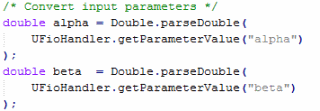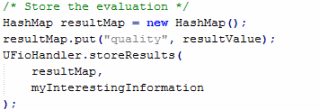Tutorial
Basic Lessons
- First-Time Setup and User Interface
- Example 1: A Simple Program
- Exploring Results: Basic Functionality
- Preparing Your Own Program
- Importing Your Own Program
- Creating Program Graphs
Advanced Lessons
- Automatically Finding Optimal Parameter Settings
- Example 2: Multiple Objectives
- Example 3: Parameter Dependencies
- Exploring Results: Advanced Functionality
- HPC and Database Configuration
- Program Graphs With Multiple Programs
Introductory Videos
Preparing Your Own Program
As explained in lesson Example 1: A Simple Program, every possible parameterization of your algorithm (according to your parameter and selection settings) results in a job, that is, an execution of your executable. Your task is to extend your code such that it reads its parameterization and writes back its results. Currently, the Ultimate Framework provides bindings for Java, C/C++, C#, and MATLAB.
In the following, the preparation procedure is described in detail for Java. For the other languages, the procedure is essentially the same, so you will be able to learn the principle from the Java example even if you use another language. You can download the example code for all languages here:
| Java: | example_java.zip |
| C: | example_c.zip |
| C++: | example_cpp.zip |
| C#: | example_cs.zip |
| MATLAB: | example_matlab.zip |
The preparation procedure using Java
 For algorithms written in Java, the Ultimate Framework provides
the class
For algorithms written in Java, the Ultimate Framework provides
the class UFioHandler that does almost all of the work for you.
→ Add the file UFioHandler.java to your project.

 → Add the line
→ Add the line UFioHandler.loadParamValuesFromXML(args[0]); somewhere
in the initialization part of your algorithm. The Ultimate Framework
passes the name of the XML parameter file as the first argument to your
executable, so this call will read the current parameterization.

 → Somewhere in your algorithm, you will now want to access the given
parameter values. Do so by using the static method
→ Somewhere in your algorithm, you will now want to access the given
parameter values. Do so by using the static method
String getParameterValue(String parameterName). For example,
you could say UFioHandler.getParameterValue("alpha") to obtain
the current value of an alpha parameter that your algorithm needs. Since
the method returns always a string, you have to convert the value manually into
the data type that is appropriate for you. For example, if you want to convert
the string into a double, you can use the static method Double Double.parseDouble(String).

 As soon as your algorithm has finished its computation, it must write back the resulting
evaluations of its objective functions. For example, your algorithm could contain
two objective functions time, which measures runtime, and quality,
which measures the quality of the computed result, based on some heuristic
or exact reference algorithm. These values will be used by the
Ultimate Framework in the Explore perspective to render performance curves
for every objective function.
As soon as your algorithm has finished its computation, it must write back the resulting
evaluations of its objective functions. For example, your algorithm could contain
two objective functions time, which measures runtime, and quality,
which measures the quality of the computed result, based on some heuristic
or exact reference algorithm. These values will be used by the
Ultimate Framework in the Explore perspective to render performance curves
for every objective function.
→ Use the static method void storeResults(HashMap<String,Double>, String)
for storing the objective function evaluations. The first parameter is a hashmap mapping
objective function names onto their values. The second parameter contains additional data
that is passed to subsequent jobs. Set it to NULL if you don't need it.
